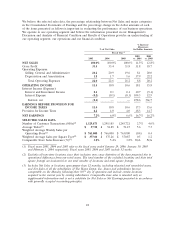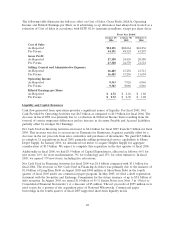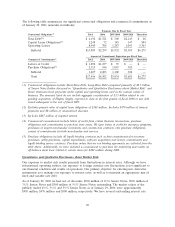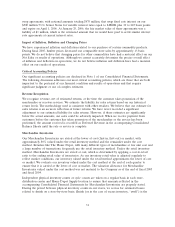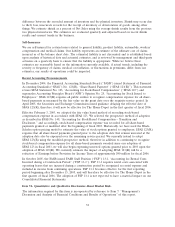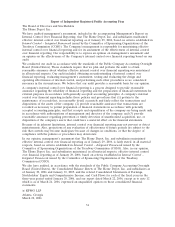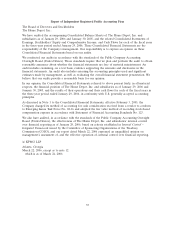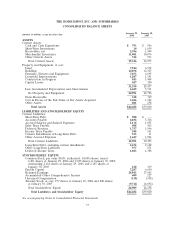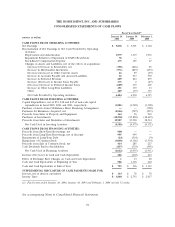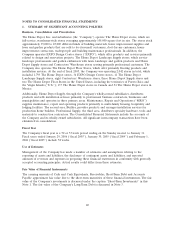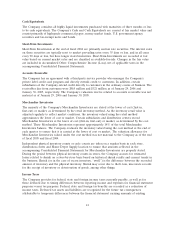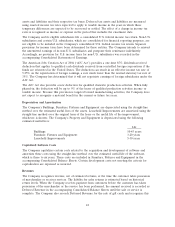Home Depot 2005 Annual Report Download - page 44
Download and view the complete annual report
Please find page 44 of the 2005 Home Depot annual report below. You can navigate through the pages in the report by either clicking on the pages listed below, or by using the keyword search tool below to find specific information within the annual report.
difference between the recorded amount of inventory and the physical inventory. Shrink may occur due
to theft, loss, inaccurate records for the receipt of inventory or deterioration of goods, among other
things. We estimate shrink as a percent of Net Sales using the average shrink results from the previous
two physical inventories. The estimates are evaluated quarterly and adjusted based on recent shrink
results and current trends in the business.
Self-Insurance
We are self-insured for certain losses related to general liability, product liability, automobile, workers’
compensation and medical claims. Our liability represents an estimate of the ultimate cost of claims
incurred as of the balance sheet date. The estimated liability is not discounted and is established based
upon analysis of historical data and actuarial estimates, and is reviewed by management and third-party
actuaries on a quarterly basis to ensure that the liability is appropriate. While we believe these
estimates are reasonable based on the information currently available, if actual trends, including the
severity or frequency of claims, medical cost inflation, or fluctuations in premiums, differ from our
estimates, our results of operations could be impacted.
Recent Accounting Pronouncements
In December 2004, the Financial Accounting Standards Board (‘‘FASB’’) issued Statement of Financial
Accounting Standards (‘‘SFAS’’) No. 123(R), ‘‘Share-Based Payment’’ (‘‘SFAS 123(R)’’). This statement
revises SFAS Statement No. 123, ‘‘Accounting for Stock-Based Compensation’’ (‘‘SFAS 123’’) and
supersedes Accounting Principles Board (‘‘APB’’) Opinion No. 25, ‘‘Accounting for Stock Issued to
Employees.’’ SFAS 123(R) requires all public entities to recognize compensation expense for all share-
based payments as measured by the fair value on the grant date over the requisite service period. In
April 2005, the Securities and Exchange Commission issued guidance delaying the effective date of
SFAS 123(R), therefore it will now be effective for The Home Depot in the first quarter of fiscal 2006.
Effective February 3, 2003, we adopted the fair value based method of recording stock-based
compensation expense in accordance with SFAS 123. We selected the prospective method of adoption
as described in SFAS No. 148, ‘‘Accounting for Stock-Based Compensation – Transition and
Disclosure,’’ and accordingly, stock-based compensation expense was recorded for all share-based
payments granted or modified after the beginning of fiscal 2003. Historically, we have used the Black-
Scholes option pricing model to estimate the value of stock options granted to employees. SFAS 123(R)
requires that all share-based payments granted prior to the adoption date that remain unvested at the
adoption date also be expensed over the remaining service period. We currently intend to adopt
SFAS 123(R) using the modified-prospective method, therefore in addition to continuing to recognize
stock-based compensation expense for all share-based payments awarded since our adoption of
SFAS 123 in fiscal 2003, we will also begin expensing unvested options granted prior to 2003 upon the
adoption of SFAS 123(R). We currently estimate the impact of adopting SFAS 123(R) will be a
reduction of Earnings before Provision for Income Taxes of approximately $40 million for fiscal 2006.
In October 2005, the FASB issued FASB Staff Position (‘‘FSP’’) 13-1, ‘‘Accounting for Rental Costs
Incurred during a Construction Period’’ (‘‘FSP 13-1’’). FSP 13-1 requires rental costs associated with
operating leases that are incurred during a construction period be recognized as rental expense and
included in income from continuing operations. FSP 13-1 becomes effective for the first reporting
period beginning after December 15, 2005, and will therefore be effective for The Home Depot in the
first quarter of fiscal 2006. The adoption of FSP 13-1 is not expected to have a material impact on our
Consolidated Financial Statements.
Item 7A. Quantitative and Qualitative Disclosures About Market Risk.
The information required by this item is incorporated by reference to Item 7. ‘‘Management’s
Discussion and Analysis of Financial Conditions and Results of Operations’’ of this report.
32


